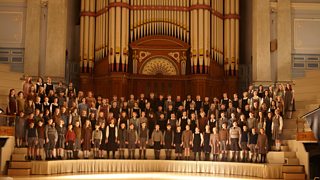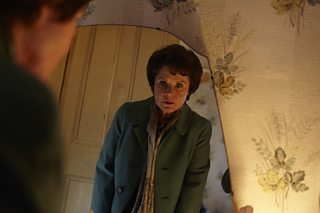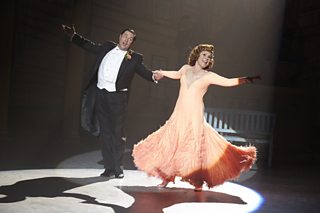That Day We Sang: It began in my bedsit
Victoria Wood
Writer and Director
In 1975, when I was 22 and on the dole in a bedsit (happy days!), I saw a documentary about the Manchester Children’s Choir who made a record of Nymphs and Shepherds in 1929. The programme featured a reunion of former choir members, now middle-aged, talking about that wonderful day when they had sung with the Hallé orchestra.

The Manchester Children's Choir performance reimagined for That Day We Sang
When I was approached by the Manchester International Festival about writing a stage piece for them, the story of that choir came into my head as a possible basis for a play.
As I started to write, the memory of that 1975 documentary grew a little stronger and the play became a musical about the reunion, and the memories of the middle-aged people whose lives had perhaps not matched up to that marvellous day.
The musical I created, That Day We Sang, had 10 performances as part of the 2011 festival at the Opera House in Manchester, but I wanted it to have a further life, and I was really lucky to be supported in that wish by Ben Stephenson at the BBC, who commissioned it as a 90-minute film.
Most people know musicals are not written, they are re-written, and it was great to have a second chance at exploring the story. I was able to write another number for my main female character Enid - which takes place in an exercise class, in her bedroom, on a bus and along a street - something which would have been hard to pull off on the stage.

Scared of life, scared of sheep, scared of thunder: Enid reflects on her timid life
And I was able to weave in extra elements of the story, for example, I expanded the character of Mr Kirkby. He is the gruff religious choir organiser, wounded in the First World War, and he develops a friendship with our boy hero Jimmy. It’s an undemonstrative relationship, but brought to life by Daniel Rigby it’s a very touching performance.
At first it’s very liberating to take something from stage to film - you can cut so easily between the two periods, the 20s and the 60s, and you can nip about from place to place without all the scene changing and prop setting of the theatre.
And then you are faced with the cold hard facts of the budget and the constraints of filming anything that is not contemporary. My story is set in Piccadilly Gardens in Manchester - in the 60s this was an ornamental gardens with flowers and shrubs and benches for office workers to have their lunch.
Now it is unrecognisable and not somewhere you would rush to have your butties.
The perfect civic space for Tubby and Enid's Fred and Ginger sequence
The children of the 1929 choir made their record in the Free Trade Hall. That hall was bombed in the Manchester Blitz and even the post-war rebuilt version has now gone, replaced by a hotel. Terraced streets tend to have replacement windows and satellite dishes now, and most streets are lined with parked cars.
But somehow, with the help of the producer Paul Frift and the imagination of the designer Tom Burton - you come up with solutions that will enhance the story without breaking the bank.
We found a lovely square in Liverpool that housed not only a perfect office for Enid to work in and a bit of pavement for Tubby to walk by on, but a cobbled area where they could meet for lunch and even sing and dance.

Tubby (Michael Ball) and Enid (Imelda Staunton) do a turn
We wanted Michael and Imelda to sing live wherever possible, and so Liverpool office workers on their own lunch breaks were treated to the sight of Michael Ball up a ladder serenading someone they couldn’t see, to an orchestral accompaniment that only Michael could hear.
But it’s a great way to record vocals if you can manage it - it gives a spontaneity and freshness and reality you don’t get when actors are lip-syncing to something they recorded weeks before.
The whole thing was a great privilege to work on and I really hope people enjoy it!
Victoria Wood is the writer and director of That Day We Sang.
That Day We Sang is available to watch in BBC iPlayer until Saturday, 19 September 2015 at 10.30pm.
It was first broadcast on BBC Two on Friday, 26 December 2015.
More on That Day We Sang
Life of Wylie: Q&A with Victoria Wood, Imelda Staunton and Michael Ball
Comments made by writers on the BBC TV blog are their own opinions and not necessarily those of the BBC.
